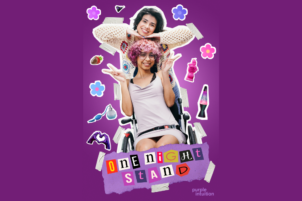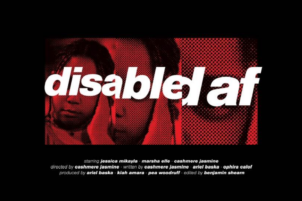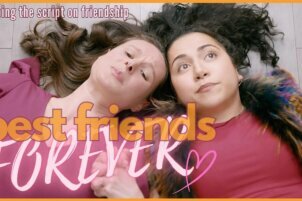
Charo Mato
New York, NY, October 6 – Charo Mato is an Argentinian filmmaker with hearing loss who graduated from the Image and Sound Design career in the University of Buenos Aires. She was a fellow of the Sundance Documentary Film Program with her first documentary film 8 Stories About My Hearing Loss, which premiered at 9° FIDBA and won Best Film at 9° Construir Cine. The film has premiered at the Buenos Aires International Documentary Film Festival (FIDBA), Santiago de Chile IFF (SANFIC), Vancouver IFF (VIFF) and won best film at the Construir Cine – Festival Internacional de Cine Sobre el Trabajo (International Labour Film Festival). She is also a recent graduate of the 2022 RespectAbility Entertainment Lab for Professionals with Disabilities.
In honor of Hispanic Heritage Month and the recent World Day of The Deaf, which was celebrated on September 26, I interviewed Charo about her recent film and her artistry in relationship to her multiple identities.
RespectAbility: How does your Latinidad play into your work and do you think it has any effect on who you are as an artist?
Mato: Of course, my latinx identity plays a role in everything in I do. It is the lens through which I see and feel, and it shapes my worldview. I am a Latina filmmaker from Argentina and I went to school in the University of Buenos Aires of Design of Image and Sound. My first feature, 8 Stories about my hearing loss, which is an Argentinian and Uruguayian coproduction, is entirely in Spanish, which is my native language.
RespectAbility: How do you think disability is represented in your culture and heritage, particularly as a deaf artist?
Mato: I think in Argentina, like the rest of Latin America, there is growing discourse around the importance of telling stories about disability from the perspective of artists with disabilities.
8 Stories about my hearing loss was well received by the public and I think its success comes from its authenticity and how it is told from my perspective, a director with hearing loss.
After having a great experience in the RespectAbility Lab, I now have a strong desire to see more of these types of opportunities in Latin America. I think these opportunities would help disabled artists find work in the industry and the opportunity for them to tell their own stories.
RespectAbility: Where do you think we need to grow in our culture when it comes to understanding deafness and disability?
Mato: First of all, I think it is important to understand that disabilities are not impediments. Disabilities don’t limit people, they just make them different. I think it is about understanding that people with disabilities are necessary in the world because they bring diversity to the Latino culture, creating a much more inclusive world. We should be open and considerate of the diversity within deafness and any disability. Accomplishing this would enrich all of us and create a better society for everyone involved.
RespectAbility: Would you mind sharing your experience as a Latina artist here in the United States? What is your experience when sharing and screening your work?
Mato: Since my migration to this country, I’ve seen different opportunities within the industry, diverse themes, and opportunities for artists with disabilities. It’s a new era that I feel lucky to be a part of. Alongside RespectAbility, I’ve learned the importance of being a part of, and contributing to, these recent changes.
In particular, I am happy about the outcomes of showing 8 Stories about my hearing loss within the United States. The movie was funded in 2020 by Sundance as a part of their post-production initiative for documentaries. We were also invited, alongside Uruguayan producer Eugenia Olascuga, to participate in the 2021 Sundance Producers Summit & Lab.
The film had its first online international premier this May in the Philadelphia Latino Film Festival. This month, we will be presenting the film in the Vancouver Film Festival, the Seattle Latino Film Festival, and the San Francisco Latino Film Festival. We are excited to meet others and share the film with an American and Canadian audience.
RespectAbility: What inspired you to make a film about your experiences with a cochlear implant? Through the process of making this film, what have been some things you’ve learned, loved, or some challenges?
Mato: The inspiration of my first film is linked to my hearing loss, which I experienced while immersed in a family with both hearing and hearing impaired members. Above all, it is inspired by the fear that my father and mother had in the face of my decision to undergo cochlear implant surgery when I was completely Deaf.
When I couldn’t find a reference for my parents in trying to communicate with them the desire I had to continue listening because I was raised as a hearing person, I decided to tell my story. I hope that this film will help other people who find themselves in this same situation.
The key moments in this creative process have to do with the degeneration of my condition, my professional life, and with life itself being an evolution of uncontrollable, enigmatic, and mysterious events.
In the process of making the film, I grew in many ways, I learned a lot, and I met wonderful people like our Uruguayan producer, Eugenia Olascuaga, at the Bolivia Lab. She is also hard of hearing and our collaboration gave rise to the co-production of the film, which brought the film much joy and a lot of strength.
On the other hand, my mother passed away suddenly. So for me, this became a film made in mourning. This has cost me a lot and gave an unexpected turn to both the making of the film and the editing.
Finally, the fact that this film exists is because my creative team, as well as my family, health professionals, and friends, have supported me in every step of these last six years. The ability to recount a part of my life while life continued to happen was the greatest challenge of my personal and creative process, since I was shaping something private to me and in each participant.
RespectAbility: How would you like to see your work grow in the future and what are some projects you would be interested in working on?
Mato: I hope to create more feature-length documentaries as well as docuseries for both large production companies and independent cinema. At the moment, I am working on projects that inhabit a hybrid documentary space, a genre that allows me to experiment. I am also committed to writing a short on disability and migration and am interested in a second feature film that is connected to metaphysics.







